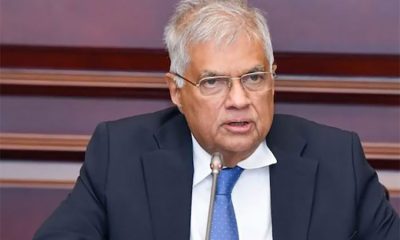Business
Ceylon Shipping Corporation turns tables on its financial performance
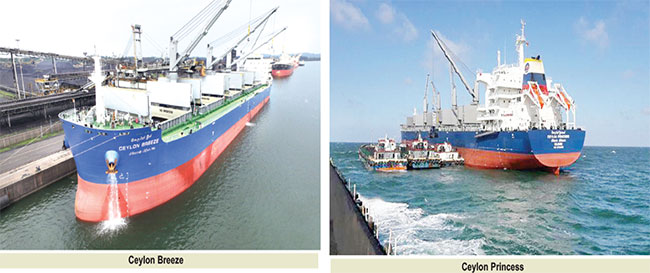
Reports loss reduction of Rs. 1.15 billion in two years
Posts Rs. 636 million profit in fist 8 months of FY 2021/22
If CSC’s fleet size is increased, country can save millions of dollars spent on ship chartering, says chairman
by Sanath Nanayakkare
The Ceylon Shipping Corporation (CSC) has made an impressive turnaround in its fortunes from a loss-making State Owned Enterprise (SOE) to a profit making SOE within two years.
In the Financial Year 2020/21, CSC has posted a profit of Rs. 636 million in the first eight months of financial year 2021/22 , changing the situation completely different from the losses it made in 2018/19 (Rs. 1,523 million) and in 2019/20 (Rs. 1,085 million) which had caused problems for them.
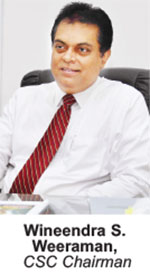 CSC Chairman, Wineendra S. Weeraman, told The Island Financial Review that the profit curve of CSC was a well thought out one.
CSC Chairman, Wineendra S. Weeraman, told The Island Financial Review that the profit curve of CSC was a well thought out one.
“When I assumed duties as chairman of CSC in December 2019, nobody was interested in taking over the helm at the CSC under such dismal financial circumstances,” he said.
Weeraman said that he first gave priority to settling a loan of USD 75 million taken from the People’s Bank by the previous management for purchasing two ships.
“This loan was on a Treasury guarantee and I decided to clear all arrears because I didn’t want to carry it forward paying a huge interest on the loan capital. In the accounts, I saw that we had an outstanding payment amounting to Rs.1,400 million which had to be collected from Lanka Coal Company – the procurement entity of the CEB. Through an official process, I was able to recover these funds and use it to repay that loan. Whatever I had to pay I paid and I took the decision to charter out our ships at the opportune moment despite the threat of Covid-19. Those were the key decisions I took and that is how we are making profits now,” he said.
Further speaking he said:
“Currently the main business of CSC is delivering coal to Norochcholai power plant. In this connection, CSC deals with Lanka Coal Company and the Ceylon Electricity Board (CEB). The CEB charters our two bulk carriers ‘Ceylon Breeze’ and ‘Ceylon Princess’ each with 62,000 deadweight tonnage, to bring in coal to Sri Lanka from South Africa. The CEB pays us in Sri Lankan rupees when they charter our vessels, but when they charter foreign vessels for the purpose, they pay in US dollars.”
“CSC brings in one third of the total coal requirement for Norochcholai Power Plant. We can help save a massive amount of US dollar payments made as ship chartering costs if CSC has its own fleet to deliver the entire requirement of coal.”
“At the height of Covid-19, despite concerns among experts that we should keep the two ships at anchorage, upon verifying of IMO regulations and the advice of Harbour Master and Medical Officer of the Sri Lanka Ports Authority, I decided to send our ships to sea and bring in much needed foreign currency to the country, without leaving the ships idling at sea incurring losses for six months. With that operation, we were able to bring in 3 million USD within about 6 months.”
“When we charter a ship to transport coal to Norochcholai Plant, procured through Lanka Coal Company, the charter hire alone costs between US$ 1.3 million and 2.0 million on top of other costs for each charter. If we have another four vessels in our fleet, we can prevent this foreign currency outflow happening time after time.”
“If we bring the fleet up to six vessels with a tanker or two, we can bring in the entire supply of coal, rice, sugar and even petroleum products without chartering international vessels over an infinite number of years. How many millions do we pay for transportation of fuel and other commodities? Being the purchaser of these products, we should be able to dictate the terms of their transportation. We can ask them to use our vessels. If the government says all fuel imports to Sri Lanka needs to be carried on CSC vessels, then we can save a lot of millions of dollars.”
“The policymakers of the government should support us in this regard. They should support key government organisations such as CSC and put some muscle into its capacity to make it more productive in its operations and empower it to support the economy of the country in a more robust way. We have made requests to policymakers pertaining to this objective including the former chairman of CSC who could assist us in fund arrangement,” he said.
“CSC’s annual turnover is about Rs. 3.8-4.0 billion whereas Sri Lanka Port’s Authority’s annual turnover is about Rs. 55 billion. Comparatively speaking, CSC is also contributing to the economy in a notable way with the limited resources it has. The CSC has great potential for growth if it gets the necessary policy support.”
“CSC employs 125 staff in-house. On each vessel we have about 22-23 crew members – that’s about 46 on both vessels and we have a reserve pool of crew for crew changes. Our salary structure is very competitive with that of international shipping lines. We pay a ship master about USD 8,500- 9000 per month. We have to pay such salaries to ensure deployment of qualified and skilled people on board our vessels. However, the upside here is that the entire crew is Sri Lankan”.
“Before Covid when we chartered out our ships to international parties during the off-season, we earned USD 8000-13,000 per day per ship. With the spread of initial Covid wave, these prices came down to USD 6,500-7,500. After the second wave of Covid, the freight rates skyrocketed to about USD 35,000-40,000. So this is the best period for the global shipping industry and we should make the best out of this situation for CSC.”
“The greatest difficulty we have with the CEB is that we fight with them to get priority to us in charter services and they also prefer to give it to outsiders upon finding one single fault that could easily be rectified. And even after providing the services for them, they take months and years to pay our dues. Then we can’t operate maintaining a positive balance sheet.”
“I would like to urge the policymakers and top officials to take bold policy decisions to beef up the fleet of CSC.”
Talking about his future plans he said:
“There are several projects which I intend to start here. There were negotiations in 2017 – with Bangladesh Shipping Corporation to operate a feeder service here. If you take Port of Colombo, its capacity is 7 million TEUs. In Bangladesh it is 3.5 million. Twenty percent of their cargo is coming to Colombo. That is about 700,000 TEUs. Bangladesh ports are very congested. Ship owners don’t like to go there because it takes days to reach a terminal. If we sign this bilateral agreement, they are going to save on the number of days spent on transportation of their cargo. If we can sign it, CSC will be able to earn about USD 2 million per year. The SLPA also will earn from it when TEUs are brought to the Port of Colombo. It will be a win-win-win situation for all parties.”
“Bunker prices are very high here compared to Singapore. Sometimes we don’t get the bunkering business unless the prices fluctuate in a competitive manner to ship operators. If we supply them bunker off-shore or out of the port, they will prefer to get oil at a lesser price. I have submitted a proposal for a floating bunker as well.”
“And then the ferry service between Colombo and Tuticorin which was started in 2011. I am planning to resume this service. Not only Tuticorin, we can try various other ports in India.”
“Going further, I have a plan to arrange medium size cruise vessels between Colombo, Male and Goa. If we arrange these tours then everybody will find them exciting and enjoy these tours bringing us revenue.”
“CSC wants to get involved in passenger transportation as well. I have signed an agreement with Sail Lanka Yachting Group, a global company that builds yachts in Sri Lanka. They are already operating from the Colombo Port City Marina. They have agreed to manufacture bigger ships to partner with CSC’s plans for passenger transportation.”
“These are plans for the future and I have submitted them to the policymakers. If we want to make a maritime hub here, these things should be facilitated.”
“Ship repairing is another area. I also wait in queue to get CSC ships repaired. In addition to Colombo Dockyard, we need to build another dockyard, ideally in Trincomalee.”
“Finally, We need to be mindful of Sagarmala Programme which is underway in India targeted to culminate by 2035. It is designed across areas of port modernisation, new port development, port connectivity enhancement and port-linked industrialisation. One day it is going to affect us. So we need to equip all critical installations here to stay in the business and thrive in the new maritime sector emerging in the region. I appeal to the policymakers and top officials of the government to support CSC with bold policy-making for its exponential growth, bolstering key business verticals of the industry at the same time.”
Business
Sarvodaya Development Finance joins Global Banking Alliance, set to host annual board meeting in Sri Lanka
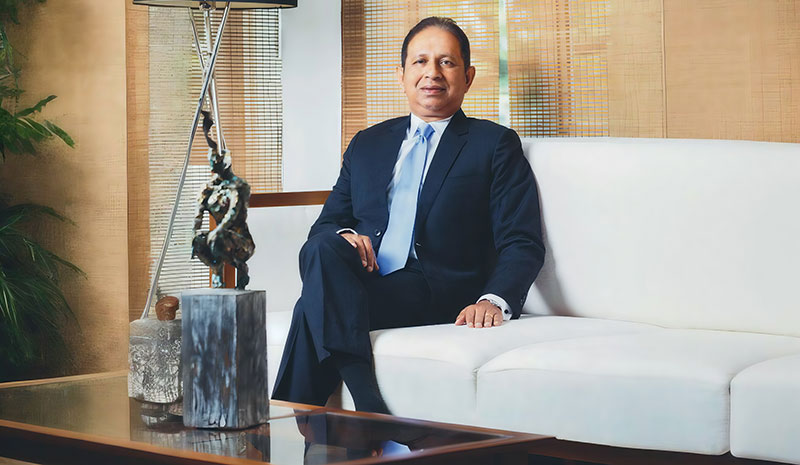
Remarking a new milestone in its pledged journey towards sustainable financing and inclusive financing,
Sarvodaya Development Finance PLC (SDF) has secured the full membership in the Global Alliance for Banking on Values (GABV), an international network of banks working to build a more sustainable and inclusive financial system.
Through this membership, Sarvodaya Development Finance PLC aims to strengthen its ability to create social and environmental impacts by expanding access to ethical financial tools, supporting community-led development, and promoting environmentally responsible lending. The alliance provides opportunities to engage with global peers, share practical knowledge, and adopt approaches that have worked in similar contexts around the world. It also allows Sarvodaya Development Finance PLC to align more closely with international standards on sustainable finance, build relationships with mission-aligned investors, and stay informed on evolving policy and regulatory trends. As part of this engagement, Sarvodaya Development Finance PLC will host the Asia Pacific Conference and the GABV Annual Board Meeting in Colombo on October 15–16, 2025, bringing together CEOs from over 12 countries to collaborate on advancing values-based banking across the region.
The 17th Annual Meeting of the Global Alliance for Banking on Values was held in Kampala, Uganda, under the theme “Building Resilient Futures.” The event brought leaders from over 70 member banks across more than 45 countries to the GABV network to discuss how values-based banks can respond to global challenges such as climate change, economic inequality, and digital transformation. Channa De Silva – the Chairman and the Nilantha Jayanetti – the Chief Executive Officer of Sarvodaya Development Finance PLC have represented the Company at this event.
Business
Sanjiv Hulugalle appointed CEO and General Manager of Cinnamon Life at City of Dreams Sri Lanka
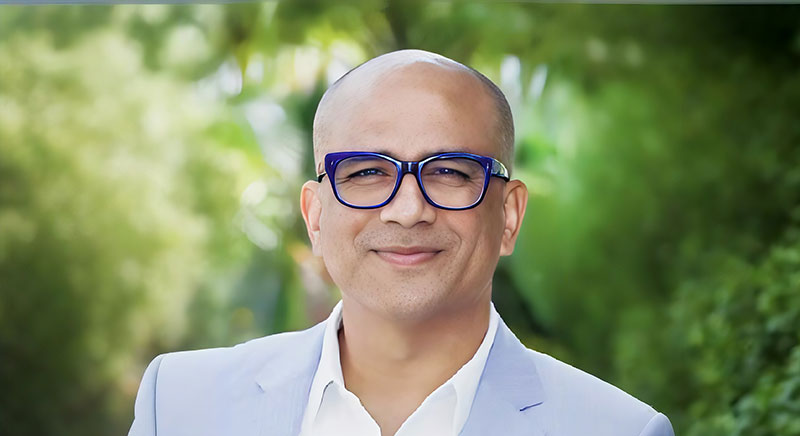
A Global Hospitality Visionary Returns Home to Lead Sri Lanka’s Most Ambitious Integrated Resort
Cinnamon Life announces the appointment of Sanjiv Hulugalle as the Chief Executive Officer and General Manager of Cinnamon Life at City of Dreams Sri Lanka, marking a pivotal moment in the evolution of Sri Lanka’s hospitality landscape.
With a career that spans over three decades and 12 countries across five continents, Hulugalle brings to Cinnamon Life an unparalleled legacy in luxury hospitality, real estate development, and transformative leadership. From the Maldives to Canada, China to the UAE, he has been at the helm of some of the world’s most prestigious hospitality and real estate ventures.
Previously the Group President of Hospitality & Real Estate at KOHLER Co., Hulugalle drove innovation and strategic growth across a diverse portfolio. At Auberge Resorts Collection, he led the ambitious repositioning of a $210 million development. His 24-year tenure with Four Seasons saw him lead top-tier teams and deliver award-winning results across the globe.
But this latest chapter is deeply personal.
Having been semi-retired, Hulugalle’s return to Sri Lanka was sparked not by circumstance, but by calling and purpose. “This is not just a role,” says Hulugalle. “It’s a way of giving back to the country that raised me—with its gracious hospitality, boundless warmth, and vibrant soul.”
“Sri Lankan hospitality is naturally gracious and kind,” he reflects. “It’s in our DNA. My mother would’ve wanted me to return and give back.”
Redefining Colombo as a City of Dreams
With Hulugalle at the helm, Cinnamon Life is set to emerge not just as a landmark development in Colombo—but as a destination, that captures the imagination of the world. Under his leadership, City of Dreams will embody the essence of modern Sri Lanka: rooted in culture, rich in character, and radiating with opportunity.
In addition to his work in hospitality, Hulugalle is also an active investor in AI-led technologies, residential real estate, and wellness-driven consumer brands, always seeking to blend strategic foresight with heartfelt service.
Business
Empowering SMEs on capital raising through listing
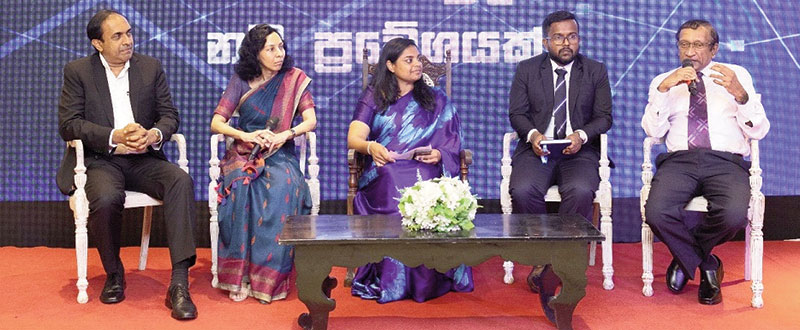
The Colombo Stock Exchange (CSE), in collaboration with the Securities and Exchange Commission of Sri Lanka (SEC), hosted an Issuer Forum in Gampaha aimed at supporting small and medium-sized enterprises (SMEs) in exploring avenues for capital raising through listing on the Colombo Stock Exchange.
The forum, titled “Redefining the Trajectory of Your Business”, provided guidance on exploring effective capital-raising avenues, specifically through listing on the Empower and Diri Savi Boards. These boards offer dedicated listing platforms for SMEs, focusing on sectors such as agribusiness, livestock, energy generation, ICT, and tourism-related ventures. Attracting over 70 participants, the forum offered valuable insights that were well received.
The main presentation of the evening, delivered by Mr. Nikila Darmadasa, Senior Management Associate of the Corporate Advisory Division at NDB Investment Bank Limited, educated the participants on the benefits of capital generation and mobilization through listing on the CSE, outlining the processes and advantages for businesses ready to grow beyond traditional financing models.
A panel discussion on “The Journey Towards Listing and Life After Listing” featured Manuri Weerasignhe, Director, Corporate Affairs, SEC; Rajeeva Bandaranaike, CEO, CSE; Nikila Darmadasa, and J.F. Fernandopulle, Managing Director and CEO, Mahaweli Coconut Plantations PLC. The session was moderated by Ms. Punyamali Saparamadu, Senior Vice President, Commercial, CSE. The panel offered practical perspectives on preparing for a listing, regulatory expectations, and the business journey post-listing.
This initiative reflects the continued commitment of the SEC and CSE to broaden access to capital market opportunities for SMEs across Sri Lanka, enabling them to scale sustainably while contributing meaningfully to the national economy.
-

 Business5 days ago
Business5 days agoColombo Coffee wins coveted management awards
-

 Features6 days ago
Features6 days agoStarlink in the Global South
-

 Features3 days ago
Features3 days agoSri Lanka’s Foreign Policy amid Geopolitical Transformations: 1990-2024 – Part III
-

 Features6 days ago
Features6 days agoModi’s Sri Lanka Sojourn
-

 Midweek Review3 days ago
Midweek Review3 days agoInequality is killing the Middle Class
-

 Features5 days ago
Features5 days agoSri Lanka’s Foreign Policy amid Geopolitical Transformations: 1990-2024 – Part I
-

 Features4 days ago
Features4 days agoA brighter future …
-

 Business2 days ago
Business2 days agoNational Anti-Corruption Action Plan launched with focus on economic recovery












